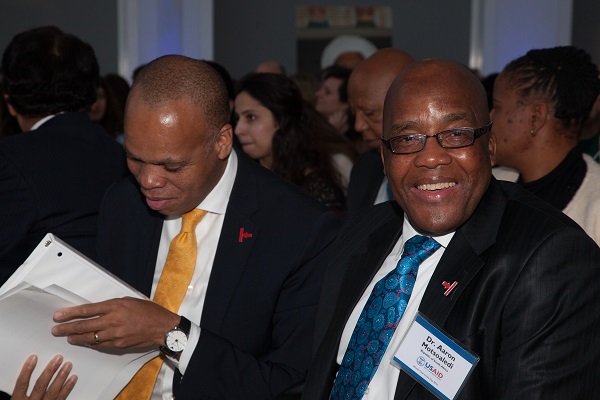18th March 2016 - Washington, D.C. - Global health leaders joined together in Washington. D.C. yesterday to pledge their support to end TB by 2030 ahead of World TB Day on 24th March.
Over 400 people attended the USAID hosted World TB Day event (watch the full event video here), where USAID presented the TB Champion Award to Dr. Aaron Motsoaledi, Minister of Health of South Africa and Chair of the Stop TB Partnership Board, in recognition of his leadership and achievements on TB in South Africa.
An award was also presented to Dr. Paul Farmer, co-founder of Partners in Health for the work that the organization has done treating TB and MDR TB affected people and supporting the poor. Ambassador Jalil Abbas Jilani, Ambassador of Pakistan to the United States, accepted the third award on behalf of the Ministry of Health of Pakistan.
Minister Motsoaledi and Dr. Farmer were joined by over 400 guests and global health leaders, including Dr. Jim Kim, President of the World Bank, Dr. Ariel Pablos-Mendez, Assistant Administrator for Global Health, USAID, Ambassador Deborah Birx, U.S. Global AIDS Coordinator, Ambassador Patrick Gaspard, U.S. Ambassador to South Africa, Dr. Lucica Ditiu, Executive Director of the Stop TB Partnership, and Mr. Nauman Rana, an MDR-TB Survivor from New York.
"Living with MDR-TB was a battle every single day. It was more than the disease itself. It was a battle physically. It was also a mental battle. I was taking drugs that were decades old and gave me very bad side effects," said Mr. Rana at his remarks. "I couldn’t understand why there wasn’t more efficient treatment or better diagnostic tools that could have diagnosed me with MDR-TB right away instead of the eight months it took to get the right diagnosis", said Mr Rana.
Dr. Ariel Pablos-Méndez, Assistant Administrator for Global Health, USAID, said "In December last year the White House launched the U.S. National Action Plan on MDR-TB. This plan commits the US government to take urgent action to combat MDR-TB domestically and also internationally. USAID is proud to support the White House Plan and lead the effort to combat MDR-TB globally".
Accepting the award recognizing South Africa’s leadership in global TB efforts, Minister Motsoaledi told the audience "it is time for the world to treat tuberculosis with the same urgency it demonstrated in responding to major new health threats like Ebola or the Zika Virus."
"We must be able to diagnose TB with a rapid diagnostic test much like we have for HIV. We must have an effective treatment that cures TB and MDR-TB in weeks, rather than months, without the debilitating effects of current treatments. And we must have an effective vaccine against TB that ensures that no one contracts TB in the first place," said Minister Motsoaledi.
South Africa been at the forefront of the TB paradigm shift called for in the Global Plan to End TB 2016-2020 and the U.S. National Action Plan on MDR-TB, including widespread roll out of use of GeneXpert for rapid diagnosis of TB, registration and uptake of new medicines such as bedaquiline to treat MDR-TB, and active screening and treatment of vulnerable populations including miners and prisoners.
Minister Motsoaledi also met with leaders in the U.S. Congress and Administration this week to call for continued U.S. leadership on global TB efforts. The Minister met with Ms. Gayle Smith, USAID Administrator, the White House National Security Council staff, the Senate Foreign Relations Committee staff and other key Members of Congress to highlight the need for continued US support, especially in low-income countries where TB is a leading infectious killer.
Delivering the keynote speech, World Bank President Jim Kim said "If we raise our aspirations to meet the needs of the poor, we need functioning health systems in every country in the world. We’ve promised it for a long time and now we have a chance to do it, and TB can be the central part of that. We’ve need to think ourselves not just as TB champions, but as warriors for the poor."
"This impressive gathering of global health leaders tonight shows that we now have the political will to end TB by 2030. We now need to match our ambition with the needed resources. Of the $13 billion per year in funding called for in the Global Plan Plan, current funding levels for TB reach only half this, including a $1 billion funding shortfall for low-income countries in 2016. Let's use March 24th to call on all countries and partners to unite to end TB", said Dr. Lucica Ditiu, Executive Director of the Stop TB Partnership.
